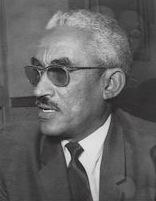Babiker Awadalla facts for kids
Quick facts for kids
Babiker Awadalla
|
|
|---|---|
| بابكر عوض الله | |

Awadalla in the 1960s
|
|
| 8th Prime Minister of Sudan | |
| In office 25 May 1969 – 27 October 1969 |
|
| President | Gaafar Nimeiry |
| Preceded by | Muhammad Ahmad Mahgoub |
| Succeeded by | Gaafar Nimeiry |
| Personal details | |
| Born | 2 March 1917 Gitena, White Nile, Anglo-Egyptian Sudan |
| Died | 17 January 2019 (aged 101) Dublin, Republic of Ireland |
| Political party | Independent |
Babiker Awadalla (Arabic: بابكر عوض الله; March 2, 1917 – January 17, 2019) was a very important politician from Sudan. He served as the country's Prime Minister for a short time in 1969. He also held other big jobs like Foreign Minister and Vice President. Awadalla lived to be 101 years old.
Contents
Early Life and Education
Babiker Awadalla was born in the White Nile State in Sudan. His birthday was on March 2, 1917. He went to Gordon Memorial College to study law. He finished his law studies in 1940.
Babiker Awadalla's Political Journey
Awadalla held several important jobs in Sudan's government. Let's look at some of them.
Leading Parliament Meetings
From 1954 to 1957, Awadalla was the Speaker of the lower house of the Sudanese parliament. The Speaker is like the leader of the meetings for lawmakers. He made sure discussions ran smoothly.
Role in the October Revolution
In 1964, Awadalla played a big part in the October Revolution. This was a time when many people in Sudan wanted changes in their country. He bravely stood against the military leaders who were in charge. His actions helped to start this important revolution.
Becoming Chief Justice
After the revolution, Awadalla became Sudan's Chief Justice in 1964. This is the highest judge in the country. In 1967, he decided to leave this job. He did this to protest a government decision. The government refused to let a political party rejoin parliament. This was even though the courts said they should be allowed.
Becoming Prime Minister of Sudan
Awadalla was part of the May 1969 coup. A coup is when a group suddenly takes control of a government. This event led to Gaafar Nimeiry becoming president.
New Government Roles
In Gaafar Nimeiry's new government, Awadalla was a special member. He was the only civilian on the National Revolutionary Command Council. This council was mostly made up of military leaders.
On May 25, 1969, Awadalla was chosen for two big jobs. He became both the Prime Minister and the Foreign Minister. He stopped being Prime Minister on October 27, 1969. However, he continued as Foreign Minister of Sudan until 1971. After that, he also served as Deputy Prime Minister and Justice Minister in 1971. From 1972 to 1973, he was the Vice President of Sudan.
Speaking at the United Nations
On September 23, 1969, Awadalla spoke at a meeting of the United Nations General Assembly. He gave an important warning. He said that if the United States kept supporting Israel during the Arab-Israel conflict, it could cause serious problems in the Middle East.
Later Years and Passing
After 1972, Awadalla moved away from Sudan. He first lived in Egypt. Later, he moved to Dublin, Ireland. He was still living there in May 2017. Babiker Awadalla passed away on January 17, 2019. He was 101 years old when he died.
Images for kids
 | George Robert Carruthers |
 | Patricia Bath |
 | Jan Ernst Matzeliger |
 | Alexander Miles |


